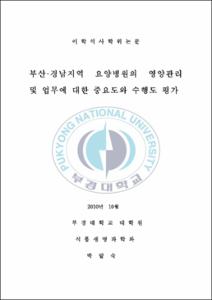부산경남지역 요양병원의 영양관리 및 업무에 대한 중요도와 수행도 평가
- Abstract
- Abstract
The purpose of this study was to evaluate importance and performance of dietitian's task at long term care hospitals in Pusan·Kyongnam Area.
The research was performed through using questionnaires and conducted from June 11 to July 16 in 2010 for 186 dietitians at 141 long term care hospital. The result was analyzed with SPSS win V. 10.0 package program.
Result of this study can be summarized as follows.
1. Surveyed hospitals located in Pusan and Kyungnam, 88 and 53 respectively. Average number of bed is 135 and 72% of hospital has 2 dietitians and 69% has a dietitian's office. Average age of dietitians is 34 and 51.6% of them have worked for less than 2 years at long term care hospital, and 37.1% of them had other jobs.
2. Primary diseases of elderly patients were dementia, diabetes mellitus, and cerebrovascular disease. And 73.3% of hospitals conducted therapeutic diet program. Average ratio of therapeutic diet is 31% and average menu cycle of therapeutic diet is 9.3days. Operating therapeutic diets were diabetic diet, tube feeding diet, sodium controlled diet and so on.
3. Dietitians have performed nutrition evaluation 32.1%, nutrition education 24.8%, and nutrition counseling 31.9% respectively. But over 70% of dietitians agreed on the need for above-mentioned items.
4. Dietitian's task importance and performance were menu·foodservice management 4.35, 4.08, purchase·inspection management 4.67, 4.63, cooking·working management 4.31, 3.98, hygiene·safety management 4.60, 4.28, and nutrition management 3.86, 2.65 respectively. Task with the largest gap between importance and performance was nutrition management.
5. For the importance of dietitian's task, there were little difference according to the characteristics of dietitian. On the other hand, for the performance, dietitians who have a career more than 4 years, a single job, an annual salary more than 20 million won as well as senior dietitians had significant high score(p<0.05, p<0.01).
6. For the importance of dietitian's task, there were little difference according to therapeutic diet care of hospital. On the other hand, for the performance, hospitals conducted therapeutic diet had significant high score(p<0.01, p<0.05).
7. Forty three percentage of dietitians agreed with the needs for role separation between foodservice dietitian and clinical dietitian. And about 61% agreed to the strengthening nutrition standards.
8. The most necessary item to enhance dietitian's task efficiency was 'raising other expert's awareness about dietitian's role'.
- Issued Date
- 2011
- Awarded Date
- 2011. 2
- Type
- Dissertation
- Publisher
- 부경대학교
- Alternative Author(s)
- Park, Mal-Sook
- Affiliation
- 부경대학교 식품생명과학과
- Department
- 대학원 식품생명과학과
- Advisor
- 류은순
- Table Of Contents
- Ⅰ. 서론
1. 서언 1
2. 연구의 목적 7
3. 연구의 목적을 위한 가설 설정 8
Ⅱ. 이론적 배경
1. 노인의 영양관리 필요성 9
2. 요양병원의 현황 11
3. 요양병원에서의 영양사의 역할 13
Ⅲ. 연구 방법
1. 조사 대상 및 방법
1) 조사 대상 16
2) 조사 방법 16
2. 조사 기간 17
3. 연구 내용
1) 조사도구의 구성 17
2) 문항에 대한 신뢰성 검증 21
3) 자료의 분석 23
Ⅳ. 연구 결과
1. 요양병원의 일반 사항 24
2. 요양병원의 급식관리 사항 26
3. 요양병원 영양사의 일반 사항 28
4. 요양병원의 주요 질환 및 치료식 관리
1) 주요 질환 31
2) 치료식 관리
(1) 치료식 관리 실태 33
(2) 실시하는 치료식 35
(3) 치료식에 대한 설명 37
5. 임상영양관리 현황 40
6. 영양사의 업무 중요도와 수행도
1) 업무 중요도와 수행도 분석 44
2) 업무중요도와 수행도의 격자도 분석 49
3) 영양사의 특성에 따른 업무 중요도 및 수행도 53
4) 치료식관리에 따른 영양사 업무 중요도 및 수행도 58
7. 영양사 업무 효율화에 대한 견해
1) 업무 구분 및 영양관리 강화의 필요성 62
2) 원활한 업무수행을 위한 필요사항 65
Ⅴ. 요약 및 제언 69
Ⅵ. 참고문헌 73
Ⅶ. 부록 80
- Degree
- Master
- Files in This Item:
-
-
Download
 부산경남지역 요양병원의 영양관리 및 업무에 대한 중요도와 수행도 평가.pdf
기타 데이터 / 789.07 kB / Adobe PDF
부산경남지역 요양병원의 영양관리 및 업무에 대한 중요도와 수행도 평가.pdf
기타 데이터 / 789.07 kB / Adobe PDF
-
Items in Repository are protected by copyright, with all rights reserved, unless otherwise indicated.